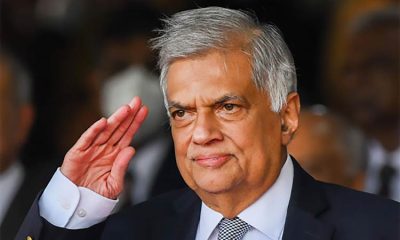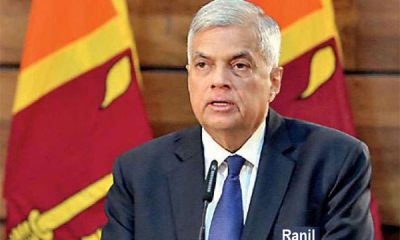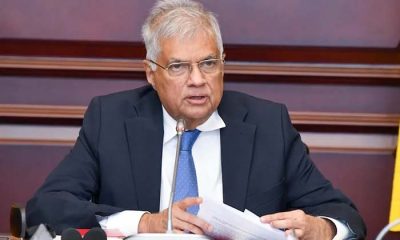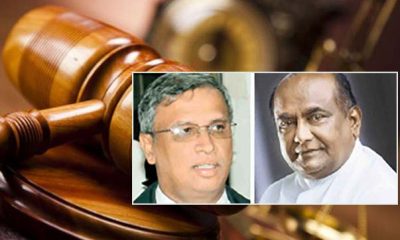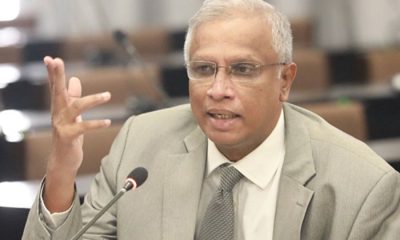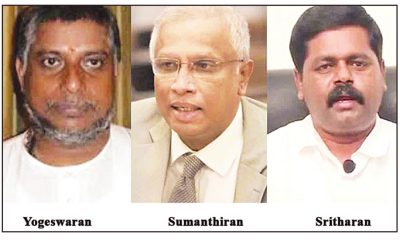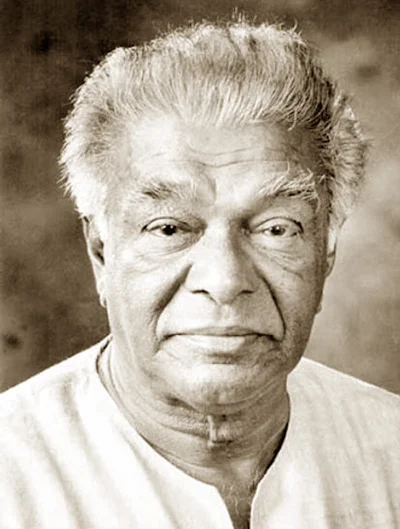Midweek Review
Formation of TNA, post-war politics and Sumanthiran’s role
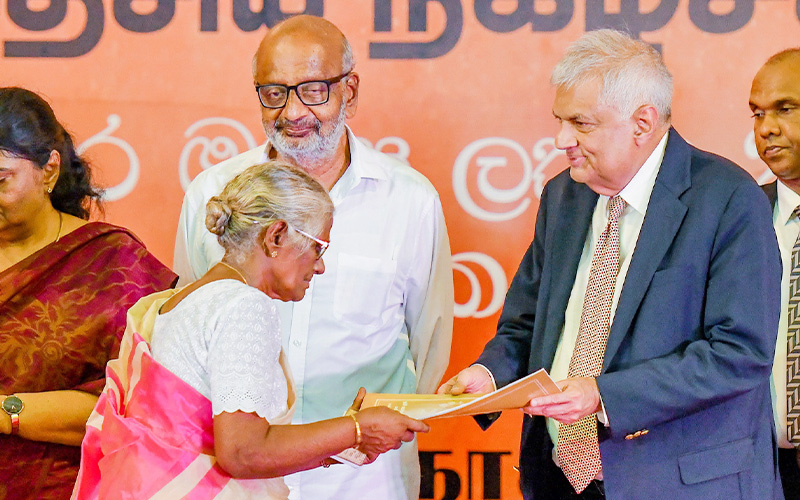
By Shamindra Ferdinando
Jaffna district parliamentarian Mathiaparanan Abraham Sumanthiran’s recent declaration supportive of the militarily defeated Liberation Tigers of Tamil Eelam (LTTE) particularly captured the public attention.
Then soon after, MP Sumanthiran surprised all by appearing on stage with President Ranil Wickremesinghe, in Jaffna, where the UNP leader bestowed land deeds on a selected group of people.
With them on stage were EPDP leader Douglas Devananda, MP, and Dharmalingam Siddharthan, MP, of PLOTE/TNA whose father, Visvanather Dharmalingam, MP (Jaffna District) was assassinated by TELO at the behest of Research and Analysis Wing (RAW) in Sept 1985. (Siddharthan himself told the writer that his father and colleague Jaffna District MP Arumugam Murugesu Alalasundaram were abducted and killed in a Mafia-style TELO operation). Will deal with Sumanthiran’s Jaffna move later.
Issuing a statement ahead of Tamil Genocide Remembrance Day that was marked on May 18 around the world, Sumanthiran, PC, now in his third term as a lawmaker, said: “Although it is my personal belief that a just political liberation cannot be achieved at the point of a gun, I have repeatedly stated that we cannot today decry or judge the decision taken by the Tamil youth who saw no other option at a time when oppression and military….”
The Illankai Arasu Katchi (ITAK) MP went on to say: “I have also consistently emphasized that the commitment and sacrifices unselfishly made by those who took up arms on our behalf should be regarded very highly.”
Sumanthiran tweeted hours before he paid respects to those who perished in fighting and the civilians at the Mullivaikkal commemoration site. However, Sumanthiran attended another commemoration also on the same day organized at the Viharamahadevi Park by several groups, including the Global Tamil Forum (GTF), to remember “all victims of war over 30 years in the North and South.”
Some found fault with MP Sumanthiran for attending the Colombo event where organizers quite rightly refrained from making reference to any particular group or community. There hadn’t been a similar remembrance event in Colombo since the end of the war 15 years ago. The same group organized an inter-religious prayer event at the Vavuniya Town Hall grounds, also on the same day.
The GTF should be commended for taking a courageous stand in spite of criticism by those who still seek advantage of the LTTE’s crushing defeat.
Perhaps, the GTF-led group should have made reference to Sri Lankans killed overseas due to terrorism, Indian military deaths here (July 1987-March 1990) and former Indian Premier Rajiv Gandhi’s assassination in May 1991 while campaigning during a general election by a brainwashed LTTE teenage suicide cadre.
The Tamil community shouldn’t confine the war dead commemoration to those who died during the last phase of the fighting with the focus on Mullivaikkal. Commemorations whether in the North, East or Colombo should be devoid of any petty racial connotation, for all were human beings. Such events shouldn’t be allowed to cause further divisions among the communities, under any circumstances. Those who make unnecessary interventions with a view to attracting media attention should be appropriately dealt with by law enforcement authorities.
We also like to ask self-proclaimed international do-gooders why they don’t show even an iota of interest in the unimaginable suffering undergoing by Palestinians at the hands of the Israelis, while they make a song and dance about imaginary genocide they claim to have happened here during the last phase of fighting.
The ITAK is the main constituent of the Tamil National Alliance (TNA) that had been formed in late Oct 2001 in line with the community’s overall politico-military strategy to achieve Eelam. Against the backdrop of the worst-ever battlefield defeat that had been inflicted on the Army in April 2000, Eelam seemed achievable. Having defeated the 54 Division, deployed at the Elephant Pass sector then widely believed to be impregnable, thereafter the LTTE almost succeeded in overwhelming the Army in the rest of the peninsula.
Muslims’ dilemma
The Sinhalese and Tamils should also publicly repent the suffering experienced by the Muslim community. That community suffered untold hardships for being steadfastly taking a stand against separatism. Had they thrown their weight behind the LTTE, the country could have been overwhelmed and the 2009 absolute victory over the LTTE couldn’t have been achieved. So, do not hesitate to recognize the Muslims’ commitment as a whole to Sri Lanka’s unitary status. They paid a very heavy price for being always supportive of the government stand for a united Sri Lanka, whoever was in power.
The 2019 Easter Sunday massacre, carried out by a group of extremist misguided Muslims, shouldn’t in any way be used against the community. Officers and men of the Muslim and Tamil communities served in the armed forces and police with distinction and made quite a contribution to the overall success of the war.
Just five months after the LTTE resumed war in June 1990 in the wake of the IPKF withdrawal from the temporarily-merged North and East Provinces, the LTTE ordered the Muslims out of the Northern region, comprising Jaffna, Kilinochchi, Mannar, Mullaithivu and Vavuniya giving them a matter of hours to leave. The then President Ranasinghe Premadasa’s government couldn’t do anything about it. The international community turned a blind eye. Tamil politicians remained silent. No one dared to challenge the LTTE’s inhumane and drastic move.
Twenty-one years later a deranged Norwegian Andres Breivik massacred 77 persons, mostly children in two attacks the attacker claimed was influenced by the LTTE’s eviction of the Muslim community from Northern Sri Lanka.
Did the late LTTE theoretician and ideologue Anton Balasingham approve of Velupillai Prabhakaran’s plan to force Muslims out of the Northern Province? Balasingham, the one-time British High Commission employee in Colombo, passed away in the UK, in Dec 2006, of kidney failure, a couple of months before the LTTE lost control of the Eastern Province.
Far right Breivik, then 32, a few hours before he went on the rampage on July 22, 2011, made reference to the LTTE’s eviction of the Muslim community from the Northern Province, in his so-called manifesto posted online. The following are the references (1) Pro-Sri Lanka (supports the deportation of all Muslims from Sri Lanka) (Page 1235) and (2) Fourth Generation War is normally characterized by a ‘stateless’ entity fighting a state or regime (the EUSSR). Fighting can be physical such as the Liberation Tigers of Tamil Eelam (LTTE) to use a modern example. (Page 1479).
Perhaps, Sri Lanka should have asked those who had been demanding international inquiry to include the Norwegian massacre in their agenda. One of Sri Lanka’s foremost diplomats, the late Jayantha Dhanapala, appearing before the Lessons Learnt and Reconciliation Commission (LLRC) in 2010, stressed on the need for accountability on the part of foreign governments. The then Mahinda Rajapaksa government, probably blinded by unfathomable victory, was not bothered. It only saw immediate political advantage out of the developments even forgetting the long term ramifications for the country.
Focus on Sumanthiran
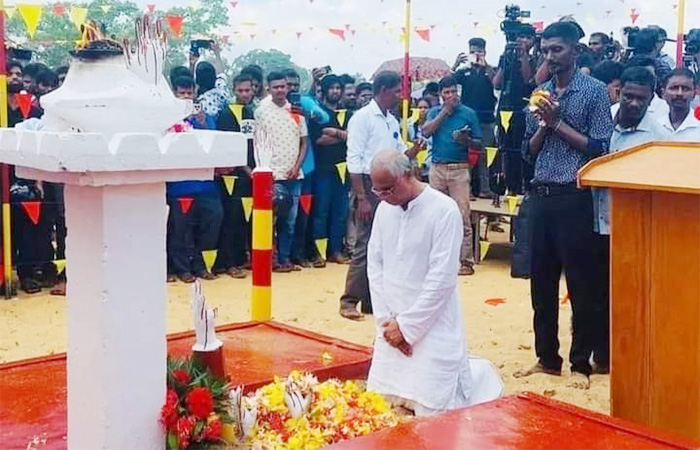
Sumanthiran on his knees before the Mullaivaikkal monument
(pic courtesy Tamil Guardian)
Maybe MP Sumanthiran should have recognized the LTTE as the group that continued the war until the very end. The parliamentarian shouldn’t have hesitated to do so though terrorism cannot be justified under any circumstances. The LTTE, however, proved its conventional capabilities throughout the war. The casualties, and the losses the group inflicted on the Indian Army underscored its fighting capabilities.
As Sumanthiran entered Parliament at the 2010 General Election, perhaps he hadn’t been affected by the LTTE’s wartime strategies and unprecedented developments that characterized the conflict, with him comfortably settled down in Wellawatte.
The writer first met Sumanthiran at A.J.M. Muzammil’s (incumbent Governor of the Uva Province) residence at No 07, Alfred House Road, Colombo 03 in June 2011. Muzammil, who had been a UNP member of the Western Provincial Council (WPC), arranged the writer to interview former Tamil Nadu State Assembly Congress I member Hasanali Kuddus at his residence. The new entrant to the Parliament Attorney-at-Law Sumanthiran, too, was there on that occasion and the writer had an opportunity to seek his opinion on some contentious matters.
Naturally, matters raised herein included the recognition of the LTTE by the TNA as the sole representative of the Tamil speaking people ahead of the signing of the Ceasefire Agreement (Feb 2002), LTTE-TNA joint boycott of 2005 presidential poll that cost UNP leader Ranil Wickremesinghe victory (the writer wouldn’t humiliate the defunct LTTE by repeating allegation that the Rajapaksas bribed the LTTE to order the boycott. The LTTE may have accepted money but the boycott was not certainly inspired by that) and still unbelievable was the TNA backing for the war-winning Army Chief Gen. Sarath Fonseka at the 2010 Presidential Poll. The TNA ensured a comfortable victory for Fonseka in the entire then merged North-East Province though he lost badly in the rest of the country. Mahinda Rajapaksa secured a second term by obtaining 1.8 mn votes more than Fonseka. A silly claim of computer “jilmaart” by Fonseka’s camp made his defeat even worse.
Kuddus, in an exclusive interview with The Island, strongly defended the eradication of the LTTE though concerns remained of atrocities allegedly committed by the military. Declaring that Sri Lanka couldn’t be punished on the basis of unsubstantiated war crimes allegations, Kuddus said that no country would be safe if legitimate governments were deprived of the opportunity to neutralize threats posed by terrorism. If Sri Lanka could be questioned over its right to hit back hard at the LTTE, what would be the position of the Indian military battling those who had taken up arms? (Congress I member Hasanali speaks out, The Island, June 16, 2011 edition)
At the April 2010 General Glection, the Tamil National Alliance (TNA) won 14 seats. Thirteen were elected while the party secured just one of the 29 National List slots. The TNA picked Sumanthiran as its NL member. It would be pertinent to mention that the TNA was placed third in terms of the number of seats won at that election. The UPFA secured a staggering 144 seats, including 17 NL slots whereas the UNP-led United National Front obtained 60 seats. Nine NL MPs were among them.
The TNA tally drastically dropped due to the eradication of the LTTE. At the previous general election conducted in April 2004, close on the heels of the devastating split in the group, the TNA won a record 22 seats, including two NL slots. The European Union Election Observation Mission, in its report found fault with the TNA for being the beneficiary of poll violence unleashed by the Tigers to stuff ballot boxes in TNA’s favour. That was the best outcome for the TNA at a general election.
At the last General Election, the TNA tally was reduced to 10 MPs. It is a pity that Sumanthiran couldn’t gain the leadership of the ITAK at a keenly contested election in January this year. Jaffna District lawmaker Sivagnanam Sritharan secured 184 votes while M.A. Sumanthiran obtained 137 votes.
Let us get back to MP Sumanthiran’s appearance on stage in Jaffna with President Wickremesinghe last week. During his brief statement, the President’s Counsel made reference to the LTTE-TNA boycott of the 2005 Presidential Poll that caused Wickremesinghe’s defeat, Mahinda Rajapaksa’s election and the unthinkable annihilation of the LTTE. The Presidential Media Division (PMD) quoted Sumanthiran as having told the gathering: “It is possible that the challenges in the North may have impeded your journey in 2005, a fact that I believe is now regretfully acknowledged by the people of the region.”
In the wake of a minor commotion over MP Sumanthiran’s appearance on stage with Wickremesinghe, the PC tweeted that his attendance at the state functions in his electorate shouldn’t be considered as an endorsement of the UNP leader’s candidature at the forthcoming Presidential Poll. The Jaffna District MP’s tweet is irrelevant. His declaration pertaining to the 2005 Presidential Poll clearly meant his support for Wickremesinghe.
The bottom line is that if not for that strategic mistake made by the LTTE and TNA in 2005, they could have achieved military superiority in the North after the then expected UNP victory as Wickremesinghe hardly making even a whimper against the LTTE. MP Sumanthiran’s politically charged statement in Jaffna should be examined also taking into consideration two key developments-in April 2003 (LTTE quit negotiating table) and January 2010 (backed General Fonseka).
The TNA could have used the opportunity to reach a consensus with President Rajapaksa if the party at least adopted a neutral stance. Instead, the TNA joined with the UNP and the JVP to defeat President Rajapaksa, thereby causing a lot of hostility. Backing Fonseka also dealt a severe blow to the TNA’s credibility in the backdrop of war crimes accusations directed at the Army.
GR meets Sampanthan at India House
Sumanthiran cannot be unaware of an attempt made by India in 2011 to work out an arrangement between President Rajapaksa’s government and the TNA.
TNA leader R. Sampanthan has been keen to normalize relations between his party and the government. The veteran politician appeared to have felt that such an arrangement could have helped his community and sought Indian intervention. But a section of the party sabotaged that effort, thereby undermining reconciliatory moves.
Following an incident at Alaveddi that had been staged by the group opposed to Sampanthan’s bid, an angry Defence Secretary Gotabaya Rajapaksa told the writer of a hitherto unreported meeting between him and Sampanthan at India House on June 08, 2011. The meeting that had taken place in the presence of the then Indian High Commissioner Ashok Kantha could have facilitated post-war reconciliation.
Pointing out that the June 16 incident at Alaveddi was meant to harm reconciliatory moves, Gotabaya Rajapaksa said that unwarranted interventions made by various interested parties, including the US, caused complications (GR alleges TNA split over Sampanthan’s reconciliation move with strapline ‘TNA pressured US State Department, several diplomatic missions to take up Alaveddi issue’ in the June 20, 2011 edition of The Island.
Recently SJB MP Mano Ganesan attacked TNA over what he called its post-war honeymoon with the government. A comprehensive post-war examination of political developments, commencing with the formation of the TNA at the behest of the LTTE, is necessary to comprehend the situation today.
The arrest of four persons in February 2017 during the Yahapalana administration, over an alleged attempt on Sumanthiran’s life, underscores the need for a wider examination of developments. The suspects held under Prevention of Terrorism Act (PTA) were granted bail in Oct 2022.
During that administration, the TNA played quite an important role with Sampanthan receiving the Opposition Leader’s post though his party had only 16 seats, including two NL slots whereas the breakaway UPFA faction comprised over 50 MPs. But, Yahapalana bosses decided in favour of TNA. In return, the TNA helped thwart President Maithripala Sirisena’s bid to form a new government under the premiership of Mahinda Rajapaksa. Formed in late Oct 2018, the Sirisena-Rajapaksa effort collapsed in 52 days. Sumanthiran played a significant role in the counter attack in support of ousted Wickremesinghe, who continued to insist he was the Premier regardless of the appointment made by Sirisena. Finally, the SC ruled in favour of Wickremesinghe. The rest is history. However, in the wake of 2019 Easter Sunday carnage, MP Sumanthiran said something which he shouldn’t have said under any circumstances. Addressing the first anniversary event of the political weekly ‘Annidha’ on April 29, 2019 at the BMICH, the TNA spokesman justified the heinous crime. He warned of dire consequences unless the government addressed the grievances of the minorities.
Sumanthiran is best remembered for his role in working out a tripartite agreement on a hybrid war crimes court as announced in Washington in June 2016.
Political parties need to make a genuine effort to move forward. The post-war reconciliation wouldn’t be realistic until parties represented in Parliament stopped playing politics with the war. The Tamil community should accept the LTTE had ample opportunities to reach consensus with the Sinhala leadership, particularly Ranil Wickremesinghe, who pursued a strategy even at the expense of his political life. The LTTE’s cardinal sin or serious error of judgment was the April 2003 withdrawal from the Norway-led peace effort. That was meant to create an environment conducive for full scale war that the group felt could have been brought to a successful conclusion by it. The LTTE was certainly ready for war in August 2005. If not, Prabhakaran wouldn’t have ordered Foreign Minister Lakshman Kadirgamar’s assassination. Full scale war commenced exactly a year later and what was widely believed to be an invincible force collapsed within two years and 10 months. Had the military not taken the civilian factor into consideration, the LTTE could have been wiped out much earlier. The ICRC said so as revealed by WikiLeaks.
Midweek Review
How Prof. Dewasiri’s FB post brought about Speaker Ranwala’s exit
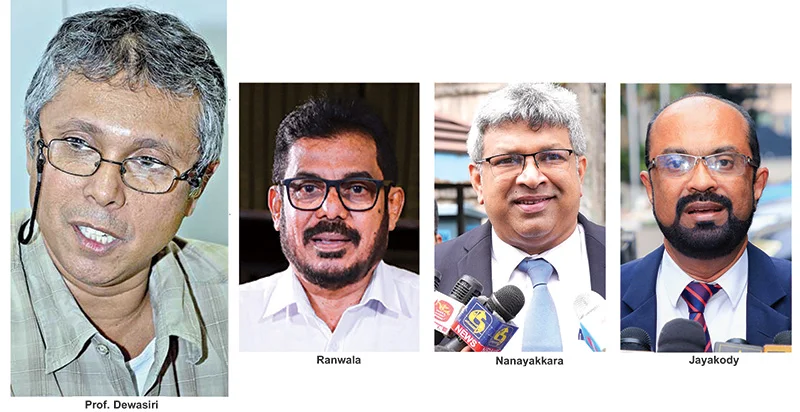
By Shamindra Ferdinando
Prof. Nirmal Ranjith Dewasiri was the first to question the National People’s Power government over Speaker ‘Dr.’ Asoka Sapumal Ranwala regarding his academic qualifications.
Dewasiri’s shock query caught the NPP by surprise. The academic questioned the government on his social media account on 05 Dec. The Parliament unanimously appointed Ranwala as Speaker of the Tenth Parliament on 21 Nov.
Dewasiri demanded that the government compel Speaker Ranwala to resign in case the parliamentarian deliberately provided false information. If the Speaker declined to do so, appropriate measures should be taken to remove him, Prof. Dewasiri declared, while finding fault with the new entrant for (i) falsely claiming to have a degree and (ii) believe he could hold such an important position regardless of the deceit perpetrated by him.
Prof. Dewasiri emphasized that the second fault was far worse than the first. One-time spokesperson for the Federation of University Teachers Association (FUTA) and advocate of the Yahapalana administration warned the government of far reaching consequences as it was badly exposed.
The government obviously didn’t take Prof. Dewasiri’s social media post seriously. Perhaps the top leadership felt that the issue at hand wouldn’t attract much public attention. However, the Opposition, both in Parliament and outside, launched an all-out attack.
The SJB declared its intention to move a no-confidence motion against the Speaker. In spite of the NPP having an unprecedented 2/3 majority in Parliament, the ruling party feared to face the Opposition move. The NPP could have easily routed the combined Opposition in Parliament, but to defend an obvious wrongdoer would have ruined President Anura Kumara Dissanayake’s (AKD) parliamentary group as they came to power, less than three months ago, promising to correct all the shenanigans that had been going on in the country, under the guise of democracy, since independence.
Beleaguered AKD had no option but to ask Speaker Ranwala to step down. The NPP could have avoided a lot of flak if the party acted immediately after Prof. Dewasiri’s disclosure. If not for the intervention made by the academic and a vociferous critic of wrongs done by the previous regimes, particularly to academics, Ranwala would still have been the Speaker.
The utterly dispirited SJB wouldn’t have inquired into Ranwala’s credentials under any circumstances. Thanks to Prof. Dewasiri, the Opposition received a mega opportunity to question the very basis of the NPP’s presidential and parliamentary election campaigns.
The SJB and new Democratic Front (NDF) had been rejected by the electorate to such an extent, even if they challenged Ranwala over his educational qualifications, the people may have ignored the issue as the rantings of a frustrated Opposition still licking the wounds of their routing at the polls. Prof. Dewasiri’s disclosure obviously delivered a knockout blow to the government.
Ranwala resigned on 13 Dec., just over a week after Prof. Dewasiri’s bombshell revelation. It would be pertinent to mention that just before the announcemnt of the Speaker’s resignation, President AKD told government media bosses that he wouldn’t protect any wrongdoer.
Having asked the electorate to reject unscrupulous political parties that had ruined the country, the NPP couldn’t have risked its political project to save Ranwala, one-time President of the Ceylon Petroleum Common Workers’ Union, until he was sent on compulsory retirement in March 2023 by the then Minister of Power and Energy Kanchana Wijesekera. The Wickremesinghe-Rajapaksa government accused Ranwala of obstructing fuel distribution services.
The NPP couldn’t have been unaware of Ranwala’s bogus claim. If Ranwala deliberately deceived the NPP, he should be dealt with harshly. Perhaps Ranwala should be asked to resign his parliamentary seat forthwith for deceiving the whole country, to pave the way for the NPP to fill that Gampaha District vacancy thereafter. Having vowed to clean up Parliament, the NPP cannot, under any circumstances, protect any wrongdoer.
But, corrupt political parties shouldn’t think for a moment that they can capitalize on the Speaker’s issue. The people rejected the SJB, NDF and SLPP (Sri Lanka Podujana Peramuna) twice this year as they earned the wrath of the people. It would be a grave fault on their part if they believed Ranwala’s ouster could strengthen their campaign against the government.
The NPP should, without delay, set the record straight. The issue is whether Ranwala deceived the NPP with regard to his doctorate, or the party knew all along that their CPC trade unionist didn’t have the academic qualification which he proudly flaunted.
House tricked
Premier Dr. Harini Amarasuriya and Foreign Minister Vijitha Herath, together, accompanied Ranwela to the Speaker’s chair. The Opposition accepted the appointment. The Premier proposed Ranwala, while Minister Herath seconded that proposal.
Premier Amarasuriya, Opposition Leader Sajith Premadasa, and Leader of the Sri Lanka Muslim Congress Rauff Hakeem congratulated National Executive Committee member Ranwala on that occasion.
One-time member of the Biyagama Local government body, Ranwala twice represented the JVP in the Western Provincial Council. According to Parliament website, Ranwala holds a degree in Chemical Engineering from the University of Moratuwa and a doctorate in Biochemistry from Waseda University, Japan.
To make matters worse for the NPP, the Opposition challenged Deputy Speaker Dr. Rizvie Salih’s specialist tag. Salih answered his critics. His FB post explained his nearly 40-year career, with 12 years with the public sector, though he is not a specialist.
The Deputy Speaker told Parliament, on Tuesday, that he is not a specialist and never used the title in his official letterheads, visiting cards and prescriptions. ” I have categorically told that I should not be called a specialist in propaganda material during elections,” he said. In other words, he had found fault with those who handled the propaganda campaign for the NPP
Interested parties also challenged the doctorate of Justice Minister Harshana Nanayakkara, another first time entrant to Parliament.
The controversy over Nanayakkara’s doctorate took an unexpected turn when the Parliament claimed that the doctorate had been inadvertently mentioned by Parliament. Let me reproduce the clarification issued by M. Jayalath Perera, Director Legislative Services / Director Communication (Acting), Parliament: Clarification Regarding the Title of “Dr.” mentioned before the name of the Minister of Justice, Attorney-at-Law, Hon. Harshana Nanayakkara, on the Parliament website.
“I would like to emphasize the following points in relation to reports published in the media regarding the title of ‘’Dr.’’ mentioned before the name of the Minister of Justice and National Integration, Attorney-at-Law, Harshana Nanayakkara, in the directory of Members of Parliament on the Parliament website.
“It is important to note that Hon. Harshana Nanayakkara has not indicated holding a doctoral degree in the information provided to Parliament. The appearance of the title “Dr.” before the Minister’s name was a result of an error in entering the relevant data. Accordingly, steps have been taken to rectify this mistake.
“I express my deepest regret for the inconvenience caused to the Minister of Justice and National Integration, Attorney-at-Law, Hon. Harshana Nanayakkara, in this regard.
“Also, the process of re-checking and updating the information of all Members of Parliament on the Parliament website is currently underway.”
But those who cannot stomach the NPP’s victory ask why didn’t Nanayakkara get that corrected himself if he was not entitled to be called “Dr.”? However, the Justice Minister lodged a complaint with the CID on Monday (16). The investigation can help ascertain whether some interested party conspired to discredit the NPP.
That clarification issued by Parliament meant that Ranwala provided false information to Parliament. According to Jayalath Perera, the parliamentary staff entered the relevant data provided by lawmakers, hence the only mistake on their part pertained to the Justice Minister’s data.
Power Minister Kumara Jayakody, too, lodged a complaint with police seeking an investigation into what he called an organized attempt to discredit him by challenging his academic qualifications. Both Nanayakkara and Jayakody speculated about the possibility of those who had been rejected by the people and their associates and supporters being involved in the high profile campaign.
The NPP cannot afford to disappoint 5.7 mn people who voted for AKD at the presidential election and 6.8 mn at the general election. The NPP increased its voter tally from 5.7 mn to 6.8 mn within a couple of weeks whereas the SJB was reduced to 1.9 mn votes from 4.3 mn at the presidential poll. The NDF was reduced to just 500,000 votes from 2.2mn at the presidential election while the SLPP increased its tally from 340,000 to 350,000. The Opposition is in disarray and in a pathetic situation.
Ranwala’s fiasco has sort of given the Opposition false hopes of a quick comeback. The forthcoming local government polls will show the ground situation. The NPP must keep in mind that in addition to the Ranwala affair, the failure on its part to provide sufficient relief to fuel and electricity consumers as promised has caused much public anger. Having repeatedly alleged that the previous government couldn’t substantially reduce fuel prices as the then Minister Kanchana Wijesekera pocketed the money, and having made those claims against the previous Minister in charge of the subject, the NPP brought down the price of a litre of Octane 92 by just 2 rupees much to the public’s resentment.
The pathetic handling of the rice mafia, too, didn’t do the NPP any good. Throughout the polls campaigns, the NPP repeatedly assured that the rice mafia would be appropriately dealt with and prices brought down and stabilized. The NPP also promised that rice wouldn’t be imported at all though imports would meet the tourist sector requirement. That much touted promise, too, was broken. However, the electorate, the writer is certain, doesn’t see any point in once again pinning their hopes on the utterly corrupt and dishonest lot rejected at the presidential and parliamentary polls.
Why Parliament shouldn’t defend wrongdoers
During the general election campaign, AKD explained why Parliament shouldn’t protect wrongdoers. The President said that the Yahapalana Parliament (2015-2019), during Karu Jayasuriya’s tenure as the Speaker, defeated a no-confidence motion moved against Ravi Karunanayake over the Treasury bond scams, especially after he told the Presidential Commission of Inquiry that probed it, he could not remember the person who gave him a luxury penthouse at Kollupitiya. Then in 2023 the Wickremesinghe-Rajapaksa government defended Keheliya Rambukwella when a no-faith motion was moved against him over corruption in the health sector procurement, the President said.
Having said so, AKD couldn’t have defended Ranwala in case the SJB handed over a no-confidence motion against him. In fact, the NPP has created an environment that may prevent those exercising political power from coming to the rescue of wrongdoers under any circumstances.
During Ranwala’s very short stint as the Speaker, he had the opportunity to receive several foreign dignitaries. Press releases issued by Parliament following those meetings referred to Ranwala as Dr. Ranwala.
South Korean Ambassador Miyon Lee paid a courtesy call on Speaker Ranwala on 04 Dec. at the Parliament complex. Secretary General of the Parliament Mrs. Kushani Rohanadeera, was also present on the occasion. This happened the day before Prof. Dewasiri exposed the NPP parliamentarian.
Ranwala, not aware of what was coming, addressed the newly elected members on 25 Nov., in Parliament, where he emphasized the responsibility on the part of newcomers (he, too, was a newcomer struggling to handle responsibilities for want of parliamentary experience) to familiarize with parliamentary procedures. Speaker Ranwala said that public expectations couldn’t be met unless they learnt about parliamentary procedures. Ranwala was addressing the inaugural session of the orientation programme for lawmakers.
The Parliament website quoted Speaker Ranwala as having emphasized the importance of organizing such workshops, noting that a thorough understanding of parliamentary traditions, constitutional frameworks, standing orders, and related parliamentary procedures is crucial for serving the people through the diverse debates conducted within Parliament.
Chinese Ambassador in Colombo Ambassador Qi Zhenhong was the first envoy to pay a courtesy call on Ranwala at the Parliament. The Chinese Ambassador conveyed the greetings of the Chairman of the Standing Committee of the National People’s Congress of the People’s Republic of China (Speaker of the Parliament of the People’s Republic of China) Zhao Leji, to the newly elected Speaker of the Tenth Parliament during the meeting.
The Chinese envoy was followed by Indian High Commissioner Santosh Jha. Jha paid a courtesy call on the Speaker on 28 Nov. at the Parliament.
The United Nations Resident Coordinator in Sri Lanka, Marc-André Franche, met Speaker Ranwala on 04 Dec.
In the wake of Prof. Dewasiri’s shocking disclosure, Speaker Ranwala received a high-level US delegation led by Assistant Secretary of State for the Bureau of South and Central Asian Affairs Donald Lu. The meeting took place on 06 Dec.
The delegation included Ms. Anjali Kaur, Deputy Assistant Administrator of the Bureau for Asia at USAID, and Mr. Robert Kaproth, Deputy Assistant Secretary for Asia at the US Department of the Treasury.
According to a press release issued by Parliament the meeting focused on Sri Lanka’s reform priorities and the critical role of the House in advancing the people’s mandate for accountability, transparency, and inclusive governance.
Ambassador of the United Arab Emirates to Sri Lanka Khaled Nasser AlAmeri was the next to pay a courtesy call on Speaker Ranwala. That meeting took place on 09 Dec. amidst a stepped-up campaign against Speaker Ranwala. The NPP seems to have operated on the premise that the controversy over the Speaker’s credentials would gradually fade away. But, the media pressed the Cabinet spokesperson Dr. Nalinda Jayatissa over the simmering serious issue. That controversy sort of overwhelmed the NPP that worked so hard to portray all other political parties, other than them, as corrupt to the core.
In fact, the NPP had nothing else but to depend on what it called a new clean political culture. Having impressed the electorate with nothing but promises and assurances that it would do the right thing, it couldn’t have a blatant liar as the Speaker.
If not for the political culture that had been introduced by the NPP, in the wake of Aragalaya in 2022, the false declaration made by Ranwala wouldn’t have been an issue at all. The people would have simply accepted it as just another lie. Our inefficient and useless Parliament had been so disgraceful in its conduct and encouraged public resentment that a Speaker’s false claim wouldn’t have caused a public furore.
The NPP’s failed bid to storm Parliament during the final push against President Gotabaya Rajapaksa should be examined taking into consideration the pathetic state of our Parliament. Some of those unscrupulous men who represented Parliament over the past two to three decades brought about the Parliament’s collapse. Instead of taking remedial measures, political parties allowed the deterioration to continue, unabated. Nothing can be as ridiculous as conducting student parliaments all over the provinces. What the Parliament really expected to achieve by promoting student parliaments at a time the very basis of the parliamentary system is under threat due to overall failure of the political party system.
Parliament must take appropriate measures to restore public confidence in the highest institution in the country. Ranwala’s affair proved beyond doubt that the Speaker, who is also the Chairman of the Constitutional Council, could manipulate the system. No one and no political party should be above the law. War-winning Sri Lanka had suffered unbearable losses for want of proper parliamentary control over public finance over the years.
Let us hope the NPP has learnt a hard lesson at the onset of AKD’s five-year term that would help the party to navigate choppy waters. The daunting challenges faced by a bankrupt country should prompt all political parties, represented in Parliament, to reach consensus on Sri Lanka’s response to the deal with the IMF, signed by Ranil Wickremesinghe. The issue the Parliament must grapple with is how to transform the sick national economy to make it possible for us to start repaying foreign debt in 2028 without making most of us absolute paupers, but many Lankans are already in dire straits economically.
The Parliament can begin by making the Supreme Court judgment on the economic crisis that led to Gotabaya Rajapaksa’s removal available to new members of Parliament. Of the 225 MPs, 162 are new entrants. The Supreme Court in Nov. 2023 issued a symbolic ruling that Rajapaksa brothers – including two ex-Presidents – were guilty of triggering the worst financial crisis by mishandling the economy.
In a majority verdict on multiple petitions filed by academics and civil rights activists, a five-judge bench of the Supreme Court ruled that the respondents, who all later resigned or were sacked, had violated public trust. But that verdict should be examined along with massive foreign loans taken by the Yahapalana government during the 2015-2019 period at high interests that contributed massively to the crisis.
Let there be no holds barred examination of the economic crisis and exposure of all responsible, regardless of their status. However, that wouldn’t be a reality unless the legislature fulfils its basic obligations in terms of the Constitution.
Let us also not lose sight of hidden hands, especially from the West who make matters worse through their cloak and dagger operations worldwide as also was put into operation here during Gotabaya Rajapaksa presidency, like even cutting off worker remittances from our banking system thereby we couldn’t even scrape together a few million dollars to clear even a shipment of cooking gas. They have done similar jugglery to so many other countries, even in our neighbourhood, as has been the case already in Bangladesh and Pakistan. Modi should not feel all that smug as we do not know what plots are being hatched against him.
Remember the uncompromising Aragalaya activists who were threatening to die for a system change in the country, but disappeared into thin air no sooner Ranil Wickremesimnghe was installed in the seat of power with the ouster of Gotabaya Rajapaksa by extra parliamentary means.
Midweek Review
Seeking cultural transmission between bodies
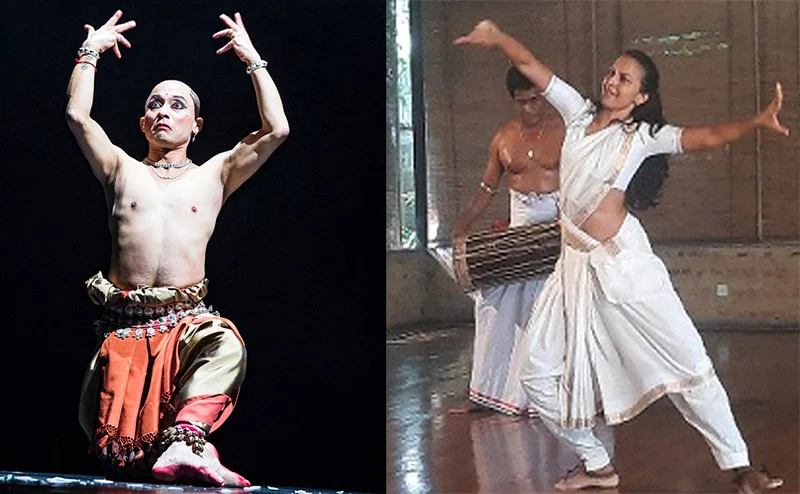
From Chitrasena to Akram Khan:
by Saumya Liyanage
Akram Khan is a world-renowned dancer, choreographer and the founder of Akram Khan Company (AKC) in the UK. He has been an impactful dancer and choreographer who was initially trained as a Kathak dancer during his apprenticeship under various Kathak Gurus in Asia and elsewhere. He and his dance company have created numerous dance productions that surpass the traditional boundaries. Akram Khan is a recipient of top awards including two Laurence Olivier Awards, the Bessie Award (New York Dance and Performance Award), the prestigious ISPA (International Society for the Performing Arts) Distinguished Artist Award, the Fred and Adele Astaire Award, the Herald Archangel Award at the Edinburgh International Festival, the South Bank Sky Arts Award, and ten Critics’ Circle National Dance Awards for his company.
With the initiative of the British Council in Colombo, the Akram Khan Dance Company contacted me a few months ago. The Legacy International Project Manager of the AKC, Varsha Kumar sent me an email informing me of an exciting project the dance company wanted to initiate in Jaffna. It was an upcoming collaboration between Akram Khan Company supported by the British Council Colombo to conduct an intense dance exchange workshop. This initiative facilitated a five-day intensive cultural transmission of Bharatanatyam dance conducted by Mavin Khoo, the artistic associate of the Akram Khan Company with a selected group of youth from Jaffna.
The idea was to continue and sustain the traditional dance forms and explore how they could be sustained and continued further through innovative practices. Mavin Khoo visited Jaffna for the first time to initiate this cultural transmission project with the hope of conducting this intense workshop on Bharatanatyam. Mavin Khoo, trained as a traditional dancer in Bharatanatyam in Malaysia, is a choreographer and the creative collaborator of Akram Khan. Mavin holds an MA in Choreography from Middlesex University and was a faculty member of the Dance Studies Department, School of Performing Arts at the University of Malta in 2014. He has been working as the rehearsal director of the Akram Khan Company and is exploring traditional dance and its contemporary relevance as a mode of human agency and provocation.
It is an ongoing work that the AKC initiated and this collaboration will continue further in future. Here is something interesting about what happened when Khoo, Varsha and their team came to Colombo after finishing the Jaffna Classical Intensive project. The British council director Edward Orlando invited me to a networking lunch in Colombo, where Khoo and Varsha were present. At lunch, I met some of the Sri Lankan dance community representatives. They included versatile dancers such as Upeka Chitrasena, Heshma Wignaraja, and Kapila Palihawadana. We shared our thoughts and ideas about dance and future collaborations during lunch. After this session, Upeka Chitrasena invited us to visit Chitrasena Dance Company. Akram Khan Company focused on helping peripheral dance groups to sustain and continue their traditional dance heritage and encouraged them to expand their possibilities of innovations, and the Chitrasena Dance Company in Colombo is also dedicated to preserving and continuing Sri Lankan traditional dance practices for posterity.
Dance as Ekstasis
- Chitrasena (1921-2005)
- Akram Khan
I am not a dancer, but I have been interested in dance and dance theatre throughout my academic career. Dance and theatre share many elements and it is the body that is central to the dancer and actor’s work. A few days ago, at the Faculty of Medicine, a session was conducted by the Centre for Meditation Research on how movement facilitates happiness and wellbeing. With my research collaborators, Kanchana Malshani and Chamanee Darshika, I demonstrated how movement is central to our understanding of the self and the world. The key question that I posed at the seminar is that movement allows us to understand our body, time and space and allows us to understand how we could connect with other bodies. Movement is the primal element of the body of the animated being.
What fascinates me here is that actor/dancer experiences time and space and the Other, in a different way than we experience the same phenomena on the daily basis. Dance scholar and Philosopher Sheets Maxine-Johnston argues that Man comprises temporality within himself, for he is such an ekstatic being. He is always at a distance of himself, always in flight” (Sheets-Johnston, 2015, pp. 16-17). This statement clearly indicates how the dance and dance experience override the objective time and space. Greek etymology of the word ekstatic means how one emancipates from her/his own self and transcends for the daily reality. In this sense, the moving body of the dancer, as I witnessed at the Chitrasena Dance Company, shows that dancers’ “being” is not in the daily reality when they intensely move their bodies in the space and time with the complex drum ensemble. Hence, I argue that our understanding about time and space is constructed through the physiological and mathematical understanding of time and space. The other is understood in a way that we as selves are constructed and defined through various lingual and cultural discourses. In this sense, the dancer/actor surpasses these constructed boundaries when the body becomes animated through dance and acting.
We sat at the Chitrasena Dance Company in the afternoon of Dec., 14 2024, and Khoo and Varsha were scheduled to leave Colombo a few hours later. An intense and galvanising performance was unveiled at the bare stage of Chitrasena Dance Company with Thaji Dias and the dance ensemble with seven master drum players. One after the other, a series of traditional dance repertoires unfolded before our eyes. Particularly Thaji Dias’ mesmerising and electrifying bodily motility of Kandyan, Low Country and Sabaragamuwa styles blended with intense rigor and precision. It was evident that some of the dance repertoires that Thaji and the lead male dancer performed were somewhat improvisational, bringing key elements of Kandyan dance into an ecstasy of performance. Both dancers seemed to be connected with each other through somatic means, communicating with facial and bodily gestures to trigger certain dance repertoire to perform together. I witnessed that both dancers were kinesthetically and sensorially joined through learned repertoires to perform a new interpretation of Kandyan dance form.
Cultural Transmission
These traditional dance performances triggered several important questions related to the dance body and cultural transmission of somatic knowledge. First, when Heshma, the artistic director and choreographer of Chitrasena Dance Company introduced a particular dance repertoire developed and choreographed by Vajira Chitrasena, she articulated this as a cultural transmission of choreographic knowledge which came through two generations of dancers. This statement triggered several important questions related to dance historiography. When Chitrasena and Vajira choreographed their works, it may have been done through the embodied knowledge that they possessed through what they learnt and mastered from the traditional Gurus. However, Chitrasena and Vijira may have understood that replicating traditional dance and its repertoire would not add any innovation to their dance interventions. My interest was drawn to this phenomenon and the question emerged on how these individual dance artists have distilled the traditional Kandyan dance to modernist choreographic works through adding innovative elements to their newly founded body notations.
Researchers who are working on the intangible cultural heritage mainly focus on how traditional dance and heritage can be transmitted. They are mainly concerned about how these traditions are continued and sustained through contemporary dance ensembles. However, the intangible heritage discourse has least focused on how these dance traditions have been changing through time and how these new elemental changes have been transformed and transmitted to the next generation of dancers. During our encounters with dance choreographer and artistic director of Chitrasena Dance Company, Heshma discussed how they “do” dance. Her articulation of “doing” dance rather than talking about dance explains how they transmit knowledge of somatic elements of dance through bodies. She said, “We rarely talk … we do not use language but we do dance”. One of the challenges posed by these issues is that the corporeal learning and embodied knowledge cannot be objectified in the researcher’s eyes. They are somatically embedded in the dancers’ bodies and are sedimented within their dance repertoires. A meticulous observation, analysis and categorisation will be required for someone to understand and identify how these dance elements have been changed and embedded in the dancer’s body. As I believe, new dance ethnographic research would be useful for researchers to extricate those elemental dance repertoires to understand how contemporary dancers’ bodies embody dance heritage in their somatic memories.
Conclusion
Akram Khan and his creative associate Mavin Khoo explore the possibilities of preserving traditional dance forms while seeking opportunities to revive them through innovative practices. The Chitrasena Dance Company working in the field of traditional Sri Lankan dance ambitiously is in search of a new era of Sri Lankan dance while passing the Chitrasena -Vajira dance heritage to the next generation of dancers and choreographers. Both companies share similar objectives in dance preservation and innovations within the highly contested Global cultural domains. Khan, Khoo, Chitrasena, Vajira, Thaji and other dancers embody a vast knowledge of somatic practices akin to their own dance traditions. Yet, these ekstatic bodies transcend the daily constructed selves, which carry the somatic knowledge of dance that are waiting to be disseminated in the bodies of the next generation of dancers. These areas of dance-ethnography should be further developed to understand the embodied knowledge and the somatic practices infiltrated through the generations of dancers and drummers. New dance-ethnography, dance historiography and new methodologies should be developed and applied to deepen our understanding of dance as an explicit knowledge of human expressions, emotions and ecstasy.
References
Sheets-Johnston, M. (2015). The phenomenology of dance. Philadelphia (Pensilvania, Estados Unidos) Temple University Press.
Company, Akram Khan. n.d. “Our Biographies.” Akram Khan Company. Cog. Accessed 2024. https://www.akramkhancompany.net/about-us/our-biographies/.
Company, Akram Khan. n.d. “Our Biographies.” Akram Khan Company. Cog. Accessed 2024. https://www.akramkhancompany.net/about-us/our-biographies/.
Nürnberger, Marianne. 2014. “Vajira – the First Professional Female Dancer of the Sinhalese Style.” Sri Lanka Journal of Humanities 40 (0): 99. https://doi.org/10.4038/sljh.v40i0.7232.
Raheem, Mirak. 2022. “Vajira: The Pioneering Female Dancer.” South Asian Dance Intersections 1 (1). https://doi.org/10.55370/sadi.v1i1.1475.
–––
Saumya Liyanage is an actor and professor in Drama and Theatre, currently working at the Department of Theatre Ballet and Modern Dance, Faculty of Dance and Drama, University of Visual and Performing Arts, Colombo, Sri Lanka. saumya.l@vpa.ac.lk
The author wishes to thank Himansi Dehigama for her assistance in preparing this article.
Midweek Review
Motherhood Triumphs
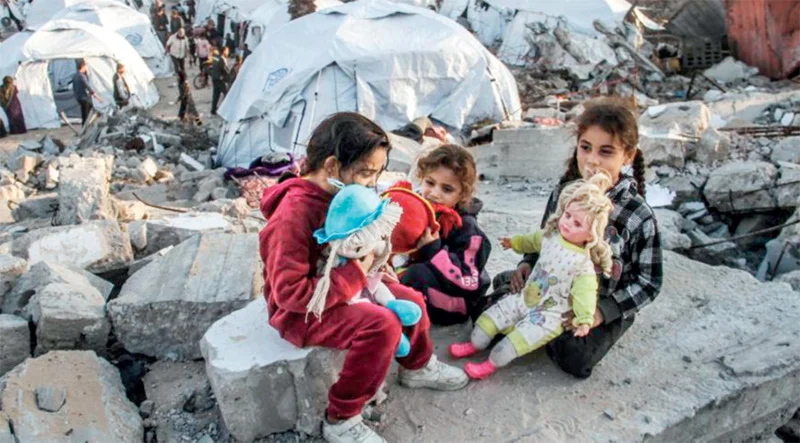
By Lynn Ockersz
Out of war’s destructive wastes,
And piles of mortal remains,
There emerge buds of promise,
Hardly into their teenage years,
That radiate childhood innocence,
And a motherhood of selflessness,
That would give fragile humans,
Their only security guarantee,
In a life rifled with uncertainties.
-

 Opinion6 days ago
Opinion6 days agoDegree is not a title!
-
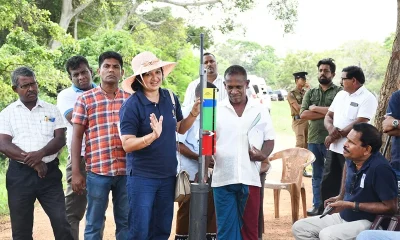
 News5 days ago
News5 days agoInnovative water management techniques revolutionising paddy cultivation in Lanka
-
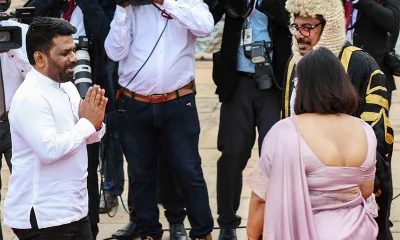
 Features4 days ago
Features4 days agoThe Degree Circus
-

 Editorial6 days ago
Editorial6 days ago‘Compass’ under the microscope
-
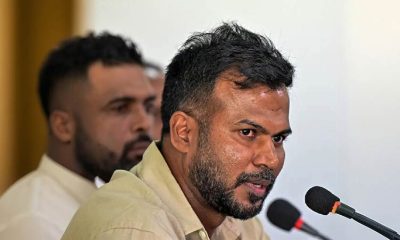
 Sports2 days ago
Sports2 days agoSri Lanka to mend fences with veterans
-
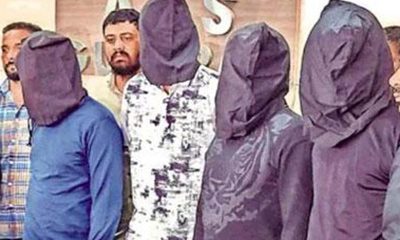
 News6 days ago
News6 days agoArrest of Lankans on terrorism charges in Gujarat: Muslim grouping renews campaign for their release
-

 Opinion4 days ago
Opinion4 days agoHas ‘Compass’ lost direction?
-

 Editorial5 days ago
Editorial5 days agoA supreme irony


